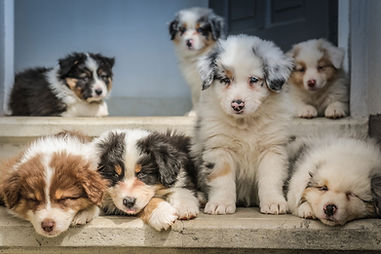PUPPY/DOG CARE
The fun is just beginning !
Puppies <1 year old
As helpless as a human baby at birth, the early weeks of a pup's life are critical to survival and the mother-puppy bond is very special. Your job as a puppy parent is to understand the normal behaviours of puppies and moms, facilitate their growth and intervene only when necessary. Once you discover mom is pregnant, she should be fed puppy chow up until the pups are weaned. This will provide adequate nutrition for mom and pups as they grow rapidly.
Here are some important things to note about your puppy as he/she grows up.
Birth
-
Must be guided to suckle immediately
(This allows the pup to receive colostrum - this is the term for the mother's milk in the first 24-48 hours after birth which is highly concentrated with antibodies, needed to build the pup's immune system)
-
Unable to regulate it's own temperature and so relies on mom for warmth
-
Ears and eyes closed
-
Totally dependent
0 - 3 weeks
-
Eyes begin to open at 10-14 days (vision weak)
-
Ears begin to open at 21 days (hearing weak)
-
Sense of smell quickly develops
-
Suckling milk from mommy's nipples (aided by smell)
-
Nursing should be frequent (>3 times daily)
-
Baby/milk teeth begin to grow
-
Dependent but now able to move around
-
Passage of urine and feces stimulated by mother
-
Rapid growth
-
Sleep sleep and more sleep

Pegasus + Oreo Litter
(Client: Eastside Kennels)
4 - 8 weeks
-
Vision and hearing improve
-
Begins to take interest in mother's food
-
Weaning begins
-
Begins to lap water
-
Three to four times daily feedings
-
Able to pass urine and feces on their own
-
Interacts with littermates and humans

Emily
(Client)
8 weeks - 1 year
-
Weaning completed
-
Transition to twice daily feedings
-
Puppy coat replaced by adult coat
-
Baby/milk teeth replaced by adult teeth
-
1st heat at 6-12 months old (females)
-
Age of maturity is breed specific

Oreo
(Client: Ewan James)
EARLY PUPPY CARE ALSO INVOLVES VETERINARY CARE !
A visit soon after birth to inspect mom and pups is in their best interest. The veterinarian puts on the Pediatrician hat and inspects the pups for any abnormalities including congenital issues which may arise due to the genetics of the mother and father. He/she will also inspect the mom to ensure there are no problems stemming from the birthing process and if so correct them. In observing the interactions of mom and offspring, the veterinarian will be able to inform the owner of anything they may need to adjust to increase the chances of a healthy litter.
Healthcare
Puppies are born with no natural immunity, which means if they are faced with any infections from bacteria, viruses, fungi etc, their bodies won't be able to fight them. Their immunity is built through:
-
Colostrum (first milk) in the first few hours of life (getting antibodies from mom)
-
Deworming at 2-3 weeks old (prevents infection caused by internal parasites) and onwards alongside vaccination. once vaccination protocol is completed, this should be done every 3 months.
-
Vaccinations (a series of 3-5 vaccinations given approximately 3 weeks apart to prime their body to respond to viruses should they come in contact with them)
Your veterinarian will choose the best protocol according to the situation.
Dogs >1 year old
As your dog grows up, nutrition, exercise, socialization and health care are important in securing a healthy companion. The General Pet Care page details basic information on having any pet which also applies to dogs. Deworming and annual booster vaccinations should continue throughout life and the frequency will be determined by your veterinarian based on the risk factors for your dog. Annual veterinary visits are recommended to ensure your dog is growing big and strong at an acceptable rate, with any health concerns being addressed.

Shadow
(Dr. Johnally's favourite boy)
The adult years are for continued growth of the human-animal bond. It's a time to play together, learn together and share memories.
Each breed has an expected lifespan and may also carry time-related health conditions that you should be aware of. For example German Shepherds are prone to developing Hip Dysplasia in their old age (8+ years). This is something you can prepare for by learning how to identify early signs.
General old age will also naturally bring about concerns for any dog regardless of breed as the body wears out. In these geriatric years, special attention will have to be paid to their eating habits, level of activity, ease of movement and general demeanor as they are all expected to slowly decrease. At this time, veterinary visits will need to be more frequent so that all can be done to allow for the best quality of life as the dog's abilities change.

